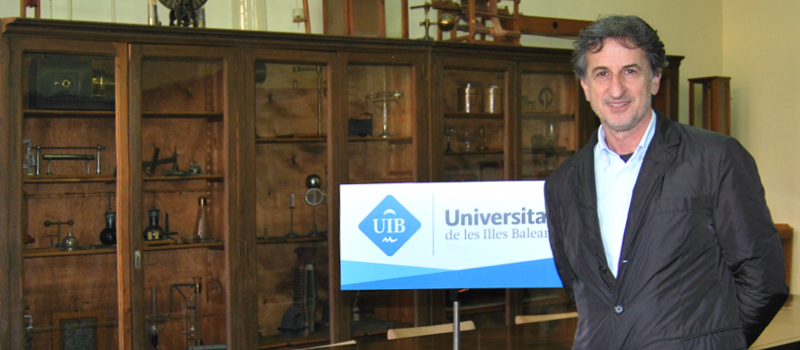Miquel Roca: "Suicide is the major cause of death in under-35's"
Interview with Miquel Roca Bennasar, psychiatrist, professor and researcher at the Universidad de Illes Balears
Miquel Roca Bennasar is a psychiatrist, professor of Psychiatry in the Department of Psychology of the Universidad de les Illes Balears, Neuroscience Area Coordinator for the university’s Research Institute of Health Sciences (IUNICS), and Senior Researcher of the ‘Prevalent mental disorders in primary health care’ research group.
As author and editor, he has published ten volumes on psychopathology and psychopharmacology, and more than 85 articles in international journals. In this interview, Roca Bennasar explains the health issues that cause mental illness and talks about the major changes needed to bring about true progress in the field of psychiatry.

– Miquel Roca, how do you currently spend your professional time?
– It’s divided between lecturing, research and health care. Research on Spanish and international projects.
– In your long career, you have had dealings with Bufete Buades and, in particular, you have forged a close relationship with its director, Joan Buades. Which of these relationships is most important to you?
– Fortunately, in my life I haven’t found myself involved in any legal disputes requiring the firm’s services (laughter), but we have worked together with Real Mallorca and other sport-related leisure activities. Aside from that, I also enjoy totally personal relationships with members of the firm, with artistic and gastronomic tastes in common.
– In relation to the current crisis, what are the mental health issues most affecting the Spanish population?
– The mental health issues are the same as those before and after the crisis, but during the crisis they have become more acute. We are mainly talking about depressive and anxiety disorders, as well as those disorders that stem from the use of toxic substances. Those are the major disorders. The most prevalent are the depressive and anxiety disorders, which are very common in the general population, probably little recognised as such because there is still a stigma attached to them that makes people think they are illnesses that should be glossed over, concealed, disguised or kept from view, despite all the research demonstrating that the impact they have on the individual, the family, society and the economy is huge. For example, we are now seeing the repercussions of depression on daily function, which includes academic and work performance. In other words, there is a social, economic and collective impact on top of the suffering on a personal level.
– Is Mallorca any different with respect to these kinds of complaints or are its inhabitants, generally speaking, affected by the same kinds of illnesses as in the rest of Spain?
[roto lado=”left” texto=”During the crisis we have seen an increase of 7 – 10% on pre-crisis figures in consultations for mental disorders” ]
– Yes, fortunately there are no differences. The prevalence parameters for mental illnesses in the Balearic Islands are comparable with the rest of Europe. In fact, a number of myths exist, for example, the belief that Menorca is an island of frequent suicides. We have already published, researched and anlaysed this and it is not true. It’s a myth, but people insist that the notorious Tramuntana winds drive people to suicide, which is false. The rate of suicide, the gravest repercussion of a mental illness, is the greatest parapsychological issue facing the health care system. If you look at the under-35’s, the major cause of death is suicide. It used to be traffic accidents, but since those have reduced significantly, the major cause of deaths in the under-35’s today is suicide. The figures for the autonomous region of Menorca are similar to those for the rest of Spain. If we analyse the situation before and during the economic crisis, however, we can see the impact that mental health has had on primary health care consulations. During the crisis we have seen an increase of 7 – 10% on pre-crisis figures in consultations for mental disorders, and in care for people with mental disorders. Now we will repeat the same study in order to compare and contrast the three periods. What we have observed is that, during the crisis, mental health has had the most impact on primary health care consultations, since in a situation of economic crisis that is where the repercussions are produced. I think it will be necessary to implement significant changes to health care services if we intend to lessen the impact. The only preventative recommendations for these mental illnesses are that people take exercise, eat well and avoid toxic substances, though that continues to be complicated for young people.
– Are public resources sufficient to treat mental illnesses?
– All the research shows they are not, and they are not for many reasons, because mental health care doesn’t require a lot of technological resources. There are no great surgeons; psychiatrists work with the same instruments they have been using for two centuries. It is a question of personal listening and of time. It is inexpensive, yet mental illnesses continue to be those that have the most impact, individually, socially and collectively. When a person arrives at a hospital with a complaint that could indicate, say, a cardiac problem, doubtless they would be subjected to a series of examinations, tests, imaging tests and so on. By contrast, in psychiatry you have to give an immediate answer without access to any such resources. We play with a lot of subjectivity and very little objectivity in the diagnostic process. In our case, psychiatry has been taken out of psychiatric hospitals and put into general hospitals, and at the moment the aim is that patients who need to be hospitalised spend as little time as possible in hospital, returning to their families and society at the earliest opportunity. As a model, this is absolutely correct: no to psychiatric hospitals, better general hospitals with short stays and early return to community and family But the community and the family are in all-out crisis. There are times you have a patient who is hospitalised, you discharge them but they have no family in the area, the closest relative is many miles away, or they don’t have anybody at all. This is by no means to say that we should go back to the old model, this is the correct model, but it has many pitfalls because in the old days families were better able to look after a mentally ill person. The family model we have now is one with its members spread across the globe, and for a patient with, for example, bipolar disorder or schizophrenia, this can be very complicated.
[roto lado=”right” texto=”Psychiatry has been taken out of psychiatric hospitals and put into general hospitals, and at the moment the aim is that patients who need to be hospitalised spend as little time as possible in hospital”]
– You have published books and articles internationally, how do you see the role of psychiatry in the coming years?
– I think it will be defined as a medical speciality in which there is a lot of research which needs to be translational. In other words, all the research being accumulated on mental illness needs to be quickly translated into benefits for the patient. I believe that is the challenge for psychiatry. Right now we are still tied to research systems that only allow us to use new technology in research itself, and we need to take the step of applying that research to the clinic and our patients. It is complex, but progress is being made in pharmacogenetics and in more personalised medicine, where clinical research and epidemiological data are being combined with genetic and biological data in order that these can be translated into benefits for patients. In that sense, psychiatry has still got a considerable amount of fascinating work to do in order to improve.

A regenerative activity after a long, hard day’s work
Reading. Someone once said that reading any page of the Encylopaedia Britannica is a cure for any ill.
Your favourite typical Mallorcan dish and who made it best
Pa amb oli (bread with olive oil) and bread with sobrasada (cured pork sausage made with paprika). My mother used to make it, now I make it myself.
Palma has been voted the best city in the world to live in. The second best, in your opinion, is…
London. London is THE city, with that emphasis.
A drink your home can never be without
Red wine, naturally.
The image that best encapsulates happiness in your childhood
The sea in summer.
A historical figure you would have liked to meet and why
Michel de Montaigne in his castle at Bordeaux.
The quality you most admire in a person
It used to be intelligence, but now that I’m older it’s kindness and altruism. I’ve changed my mind on that.
Do you read the press in print or have you gone digital?
Both. Human life these days is reading the print version over breakfast with a coffee and reading tomorrow’s online version last thing at night.
Miquel Roca is never apart from…
Any book.





































